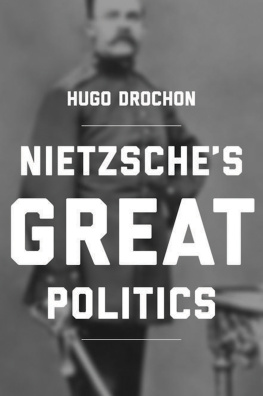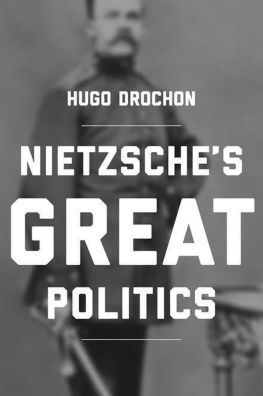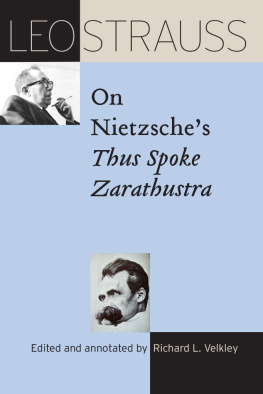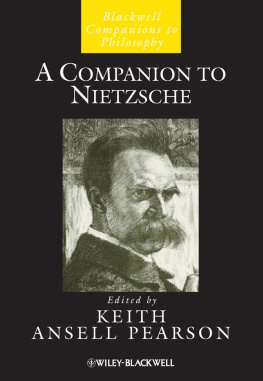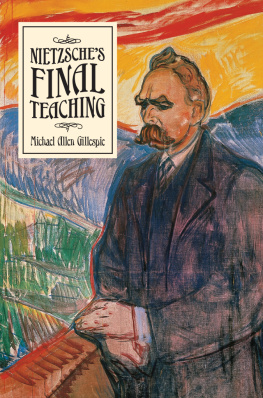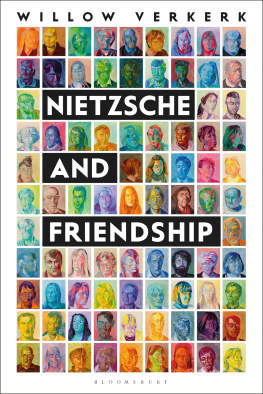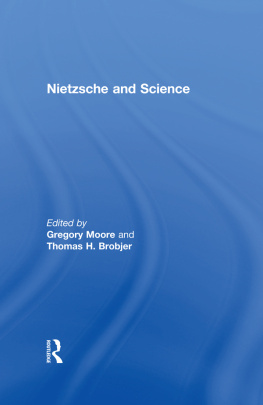
NIETZSCHES GREAT POLITICS
NIETZSCHES GREAT POLITICS
HUGO DROCHON
PRINCETON UNIVERSITY PRESS
Princeton and Oxford
Copyright 2016 by Princeton University Press
Published by Princeton University Press, 41 William Street,
Princeton, New Jersey 08540
In the United Kingdom: Princeton University Press, 6 Oxford
Street, Woodstock, Oxfordshire OX20 1TW
press.princeton.edu
Jacket image: Friedrich Nietzsche, c. 1868
Jacket design by Jess Massabrook
All Rights Reserved
ISBN 978-0-691-16634-6
Library of Congress Control Number: 2015958004
British Library Cataloging-in-Publication Data is available
This book has been composed in
DIN 1452 Std & Sabon Next LT Pro
Printed on acid-free paper.
Printed in the United States of America
1 3 5 7 9 10 8 6 4 2
DEDICATED TO THE MEMORY OF
ISTVAN HONT
CONTENTS
ACKNOWLEDGMENTS
Friedrich Nietzsche was not enamored with origins, but at least one fundamental stage in the genealogy of this book was my PhD Nietzsches Great Politics and His Revaluation Project, which I completed at Cambridge in 2012. During that time, and indeed continuing to this day, Melissa Lane has proven to be a model of academic supervision and direction, and has always demanded the best of me, for which I am eternally grateful. The late Istvan Hont also served as a true inspiration and intellectual father figure, and he is acutely missed. Although my work did not fall into his immediate field of inquiry, he made me confront the real issues at stake, and why they mattered, in a way that will undoubtedly influence the rest of my research. This book is dedicated to his memory.
Thanks to Duncan Kelly and Keith Ansell-Pearson for examining the dissertation, and doing their best to put it on the right track. Thanks also to Martin Ruehl for his advice both on and off the basketball court, and while the latter can unfortunately no longer be, I look forward to more Nietzschean adventures in the future.
Since 2013, I have had the great fortune to be part of a Leverhulmefunded project on Conspiracy and Democracy, based at the Centre for Research in the Arts, Social Sciences, and Humanities in Cambridge. My research colleagues thereTanya Filer, Rolf Fredheim, Rachel Hoffman, Nayanika Mathur, Andrew McKenzie-McHarg, and Alfred Mooreunder the benevolent watchful eyes of Richard Evans, John Naughton, and David Runciman, have made for an exceptionally stimulating and fertile environment. I would especially like to thank David Runciman, who made not solely my position but also this book possible, for offering a true exemplar of academic acuity, career support, and life values that I will endeavor, although invariably fail, to emulate. Many thanks also to Andrew McKenzie-McHarg for having taken the time to read large parts of this book, and always offering incisive and helpful comments, suggestions, and spot-on stylistic tips; in this you are certainly more Nietzschean than I will ever be.
At Princeton University Press, I would like to thank Al Bertrand for having confidence in this project from the start, and his assistants Quinn Fusting and Jaime Estrada. Thanks also to Kathleen Cioffi for production assistance, and Cindy Milstein for her patient and professional copyediting in this difficult time for her. Tracy Strong and another anonymous reviewer provided warmly encouraging and helpful remarks. They saved me from many mistakes, and those that remain are purely my own. I am indebted to Adrian Moore and Patricia Williams for permission to view Bernard Williamss unpublished piece Can There Be a Nietzschean Politics from his private papers, and the late Geoffrey Hawthorn for facilitating this. This text is not available to the public, was not intended by Williams for publication, and therefore cannot be treated as an accurate record of his views. There is no reliable evidence that it is the text of his talk in Cambridge.
I have had both the immense pleasure and great honor to discuss my work with a number of different people over the last while, across the United Kingdom, France, Germany, Italy, and the United States. There are simply too many to be able to mention here, and picking out a few is naturally an arbitrary enterprise. But those I fail to mention should recognize themselves here and know my thanks in any case: Christa Davis Acampora, Thomas Brobjer, Yannis Constantinids, Don Dombowsky, Manuel Dries, Raymond Geuss, George Kateb, Duncan Large, Enrico Mueller, Jan-Werner Mueller, Alexander Nehamas, David Owen, Aaron Ridley, Heike Schotten, Herman Siemens, Andreas Urs Sommer, Yannick Souladi, and Werner Stegmaier. Thanks also to my friends and colleagues at Cambridge: Duncan Bell, Jocelyn Betts, Christopher Bickerton, Annabel Brett, Christopher Brooke, Joseph Canning, John Dunn, Anna Hont, Joel Isaac, Samuel James, Christopher Meckstroth, Glen Rangwala, John Robertson, Or Rosenboim, Magnus Ryan, Paul Sagar, Richard Serjeantson, Micheal Sonenscher, Gareth Stedman Jones, Tim Stuart-Buttle, Helen Thompson, Sylvana Tomaselli, Damian Valdez, and Waseem Yaqoob.
For the last three years I have lived at 118 Thoday Street with Thomas Hopkins and Alexis Papazoglou. They have been life companions in every sense of the word, and I would like to thank them both here, while wishing them the best in their future lives and careers. Thomas Hopkins in particular has been an intellectual companion since our PhD years, and I have little doubt that that companionship will last a lifetime.
None of this, of course, would have been possible without my family. Im grateful to my parents, Annie and Tommy Halferty, for their unfailing emotional and financial support; and my sister, Maud, her husband, Chris, and my nephews and niece, Scott, Thomas, and Lara, all a constant source of joy. Thanks also to my aunt Anne-Marie Wagnon for her education.
I finished writing this book in Sicily, and while it is not exactly aus Messina, Pauline Blistne has certainly made my life an idyll.
, without sections 5 and 6, will appear as An Old Carriage with New Horses: Nietzsches Critique of Democracy in History of European Ideas (forthcoming).
EDITIONS AND TRANSLATIONS USED
The reference critical edition of Friedrich Nietzsches work is Giorgio Colli, Mazzino Montinari, et al., Werke: Kritische Gesamtausgabe (KGW) in forty volumes, along with its abridged fifteen-volume paperback edition, Smtliche Werke: Kritische Studienausgabe (KSA). For translations of the main published works, I have relied on the Cambridge University Press editions (see the bibliography). For the unpublished notes, I have primarily relied on Frank Cameron and Don Dombowskys anthology Political Writings of Friedrich Nietzsche, and also consulted Walter Kaufmanns edition of The Will to Power and, to a lesser extent, Richard Grays translation of Unpublished Writings from the Period of Unfashionable Observations. Other translations of the late Nachlass are my own. Nietzsches letters are organized into eight volumes by Colli and Montinari in Smtliche Briefe: Kritische Studienausgabe (KSB). When possible, I have used Christopher Middletons translations in Selected Letters of Friedrich Nietzsche. Other translations are my own. I cited letters by addressee and date.
ABBREVIATIONS
AC:The Antichrist
AOM:Assorted Opinions and Maxims (HH II)
BGE:Beyond Good and Evil
BT:The Birth of Tragedy
CW:The Case of Wagner
D:Daybreak
DD:Dithyrambs of Dionysus
Next page
